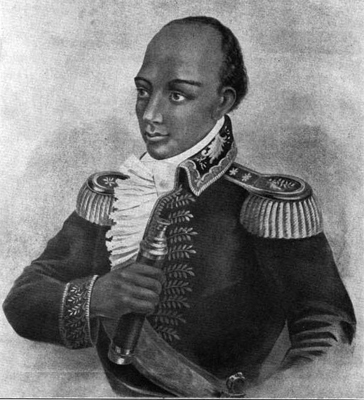Notes on Tousssaint
Louverture (1743 – 1803)
Toussaint Louverture was born one
year after Tupac Amaru, the Inca rebellion leader in Peru. Like his Incan contemporary,
Toussaint Louverture was both a precursor to Latin American independence
movements and an actual leader of a successful war of independence. Born in Haiti as a slave, he was nevertheless the
grandson of an African king in France's
most prosperous colony in Latin America in the
18th century. In 1789, the year of the French Revolution, Haiti (for country notes, see: => Haiti),
which was then the French-speaking part of the Caribbean island then called
Saint-Domingue, because the whole island—though divided between
French-speaking and Spanish-speaking regions—was owned by France, had a
small population of white European and Creole rulers and a population of a half
million black slaves and some free blacks and mulattoes. The French Revolution
outlawed slavery, but the white slave owners, who favored the French monarchy
rather than the French revolutionaries like Robespierre and Danton, refused to
free their slaves. This refusal to follow the new dictates coming from the
metropolis in France
motivated the slaves to revolt, and their revolt led to widespread murder and
pillage. In 1791, Toussaint Louverture, who had been freed earlier, became the first
leader of the black slaves independence and freedom movement. He used his private
fortune to underwrite the rebellion. Haiti then was ruled by Toussaint's
army of former black slaves and people of color. In all, he had to fight
carefully against France, England, and Spain. By 1801 he controlled all of
Haiti, the French-speaking
half of the island
of Hispaniola, but the
Spanish-speaking section did not join his movement. Toussaint created a
constitution which emancipated the slaves, but, in order to continue the
immense prosperity that came from the former slave plantations, Toussaint
himself imported new African slaves. In 1802, the new ruler of France, Napoleon
Bonaparte, was shown a copy of Toussaint's Haitian Constitution—Haiti had not yet declared its full independence
from France.
Under immense pressure from Haiti's
dispossessed while plantation owners and their supporters in France, Napoleon said: "Never
again will I leave an epaulette on the shoulder of a Negro." (Years later,
Napoleon also said that opposing Toussaint Louverture and freedom for slaves was
one of the biggest mistakes he ever made.) Then Napoleon sent 54 French
warships under General Leclerc to put down the slave rebellion. After
terrifying battles and atrocities on both sides, Toussaint was captured by the
French army. He was imprisoned in France, where he died in 1803. In
1803, however, France
withdrew from Haiti, thereby
making Haiti
the first Latin American country to gain its independence from a European
metropolis.
 |
 |
|
|





